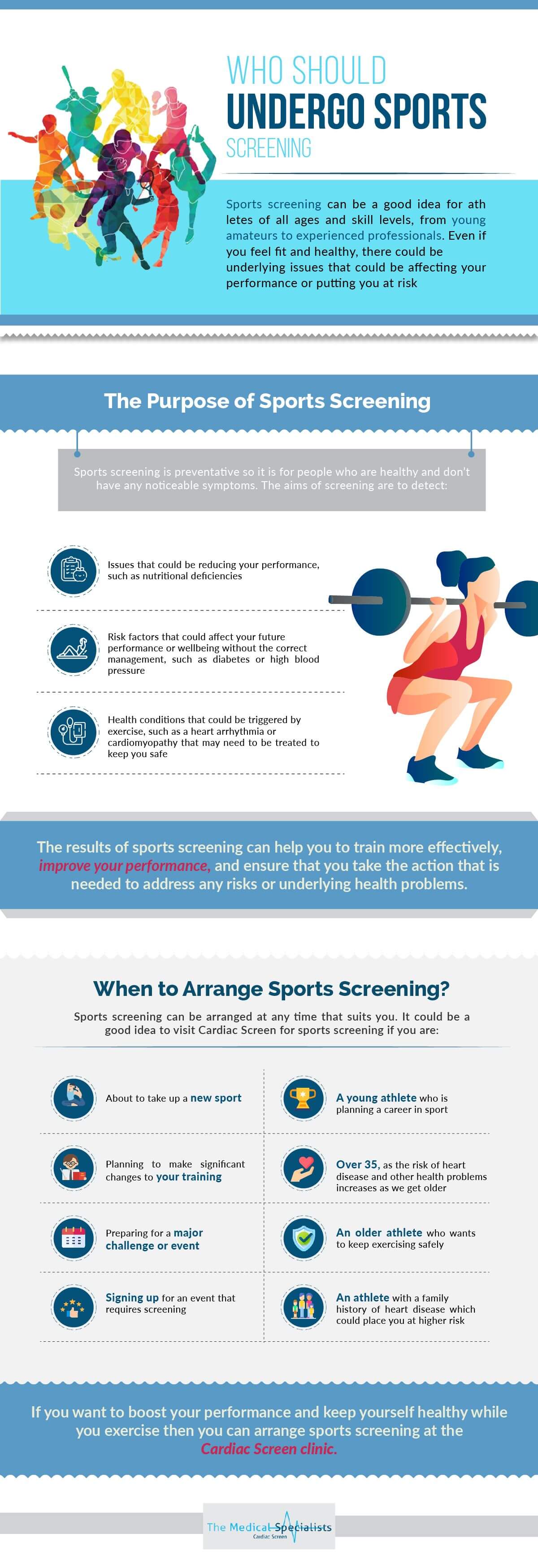Who Should Undergo Sports Screening?
Sports screening can be a good idea for athletes of all ages and skill levels, from young amateurs to experienced professionals. Even if you feel fit and healthy, there could be underlying issues that could be affecting your performance or putting you at risk.
The Purpose of Sports Screening
Sports screening is preventative so it is for people who are healthy and don’t have any noticeable symptoms. The aims of screening are to detect:
- Issues that could be reducing your performance, such as nutritional deficiencies
- Risk factors that could affect your future performance or wellbeing without the correct management, such as diabetes or high blood pressure
- Health conditions that could be triggered by exercises, such as heart arrhythmia or cardiomyopathy that may need to be treated to keep you safe
The results of sports screening can help you to train more effectively, improve your performance, and ensure that you take the action that is needed to address any risks or underlying health problems.
When to Arrange Sports Screening
Sports screening can be arranged at any time that suits you. It could be a good idea to visit Cardiac Screen for sports screening if you are:
- About to take up a new sport
- Planning to make significant changes to your training
- Preparing for a major challenge or event
- Signing up for an event that requires screening
- A young athlete who is planning a career in sport
- Over 35, as the risk of heart disease and other health problems increases as we get older
- An older athlete who wants to keep exercising safely
- An athlete with a family history of heart disease which could place you at higher risk
If you want to boost your performance and keep yourself healthy while you exercise then you can arrange sports screening at the Cardiac Screen clinic.
What Are the Different Types of Cardiac Tests?
Cardiac screening can include a range of different tests to look at different aspects of your heart health.
ECG
- Monitors the electrical activity in your heart that controls its beating
- Sensors are attached to your skin while you lie down and relax
- Produces a line chart showing changes in electrical activity as your heartbeats
- Used to diagnose conditions such as heart arrhythmias that cause abnormal heartbeats
- Can also detect coronary heart disease and help assess the risk of a heart attack
- Painless, non-invasive and completely safe cardiac test
- Usually completed in just a few minutes
Exercise ECG Tests
- Uses similar equipment to the resting ECG to monitor electrical activity in your heart
- Performed while you are exercising on a treadmill
- Can reveal issues that only cause symptoms when you are physically active
- May be performed as part of sports screening or if you have symptoms that are triggered by exercise
Ambulatory Tests
- Portable device that monitors your cardiac health as you go about your usual routine
- Usually worn for 24-48 hours
- Portable ECG can monitor electrical activity in your heart
- Portable blood pressure monitor can also be used to detect cardiovascular problems
- Can detect issues that only occur some of the time, such as unpredictable arrhythmias
Echocardiogram
- Ultrasound scan of your heart
- The ultrasound probe will be moved across your chest
- Produces moving pictures of your heart in real-time
- Reveals the structure of your heart, which can reveal any abnormalities such as thickening of the heart muscle
- Shows your heart beating, which can reveal functional issues such as problems with the movements of the heart valves
- Can be used to assess the damage after a heart attack
- Painless, non-invasive and completely safe cardiac test
Other types of tests may also be performed to learn more about your cardiovascular health:
- Blood tests
- Urine tests
- Lung function tests








